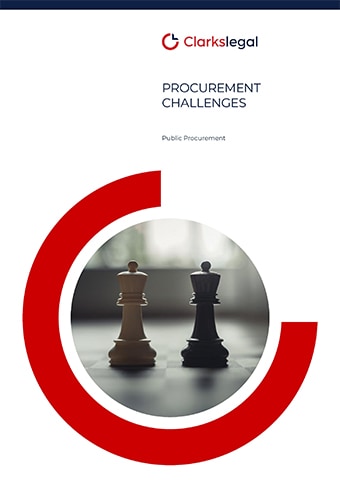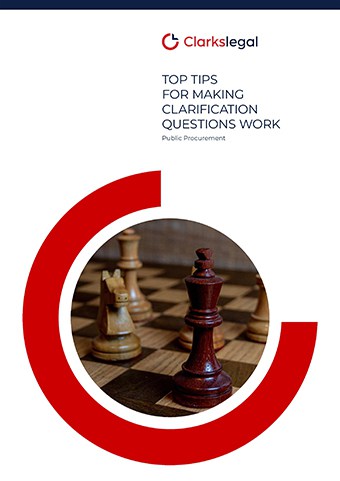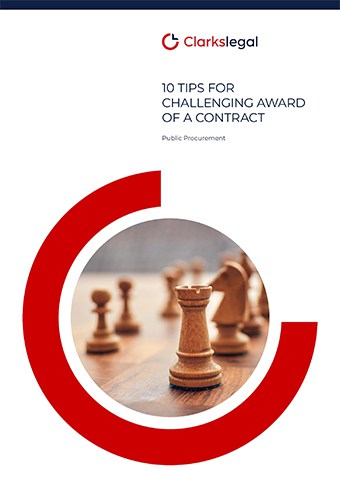Public procurement challenges
We regularly advise clients on bringing and defending challenges to procurement awards under the Procurement Act 2023 (and its predecessor, the Public Contracts Regulations 2015).
We act for both contracting authorities, advising them on how to avoid challenges and defending them if they do arise, and for unsuccessful bidders who wish to challenge award decisions where they believe errors have been made or processes have not been conducted in accordance with the law.
Although we deal with issuing court proceedings where necessary, we are often able to achieve excellent results for our clients without the need for formal legal action.
“Standout practice group, which is regularly involved in high-profile cases. Offers broad commercial litigation capabilities, alongside expertise in procurement challenges.”
Chambers & Partners
FAQs – Procurement challenges under the Procurement Act 2023
First, check whether the tender involved is regulated by the Act. Only contracts tendered by public bodies (i.e. central government authorities, local authorities and other public bodies such as universities and NHS Trusts) are subject to the Act. Tenders run by private companies are not covered and cannot be challenged under the Act.
Next, check the value of the contract. Most parts of the Act only apply to contracts which are above a certain threshold in value, which is approximately £139,688 for central government authorities, £214,904 for local authorities and other public bodies where the contract is for the supply of goods or most types of services, or £5,372,609 for public work contracts.
Under the Act, contracting authorities must comply with key overarching procurement principles. These are:
- Having regard to the importance of delivering value for money, maximizing public benefit, sharing information and acting with integrity;
- Treating suppliers equally and taking all reasonable steps to ensure suppliers are not put at an unfair advantage or disadvantage;
- Having regard to the barriers which SMEs may face and considering how they can be removed or reduced.
Breaching one or more of these overarching principles may give rise to a challenge, for example:
- Evaluation challenges – where a contracting authority may have wrong excluded a bidder, favoured one bidder over another, or not applied the award criteria correctly.
- Procedural challenges – where the contracting authority may have failed to advertise a contract, failed to provide the information it is required to include within the Assessment Summary or entered into a contract with the winning bidder before the standstill period has expired
- If there is a problem with the way the tender was designed – for example the tender might impose requirements or award marks in a way which favours one supplier over others, or the tender documents might breach the rules on technical specifications or contain a mistake.
Sometimes it is possible to resolve a challenge via correspondence between parties. If that is not possible, then the next step is to issue court proceedings. However, the Act imposes very tight timescales, so the scope for negotiation by correspondence is limited. Often very quick decisions need to be taken on whether the merits and value of the claim justify issuing proceedings, which is an expensive step. For claims valued at £200,000 or more, which many procurement claims will be, the court fee for starting the proceedings is £10,569.
Unsuccessful bidders are often very disappointed to have lost a tender they may have spent many hours working on. It is important for contracting authorities to identify quickly those challenges where the bidder has raised a genuine complaint about the procurement award and those challenges which are unjustified.
If a mistake has been made during the tender process, this can often be rectified without the need to abandon the whole tender. In other cases, where the challenge is wrong or misconceived, the contracting authority will need to persuade the unsuccessful bidder why this is so or, failing that, be prepared to defend their award if they are sued.
A common challenge for unsuccessful bidders is obtaining the information they need to work out whether the bids have been marked correctly. Most of the relevant information will be held by the contracting authority. under the Act, authorities are required to provide bidders with an Assessment Summary, which must contain, for both the bidder and the successful tenderer:
- The scores for each award criterion and sub-criterion.
- An explanation for each score by reference to the relevant information in the tender.
- If relevant, the reasons why an unsuccessful tenderer was disqualified.
There will often be a tension between the interests of the unsuccessful bidder, who wants disclosure of all available information about the way their tender was marked, and the contracting authority, who want to avoid being involved in what they see as a pointless disclosure exercise where a disappointed bidder is ‘fishing’ for information which might support a challenge.
With only eight working days to decide whether to issue proceedings in order to prevent the contract award, a bidder needs to act very quickly to seek further information from the contracting authority. Generally, the contracting authority is expected to disclose the key information needed by the bidder to understand why they have lost, which usually includes disclosing the scoring reports. A contracting authority who refuses this level of disclosure may find they are disallowed from using the same evidence in support of an application to lift the automatic suspension imposed when proceedings are issued.
If a tender has been wrongly awarded, some or all of the following can be claimed for:
DAMAGES: To compensate the unsuccessful bidders for the profits it would have made had it been awarded the contract, provided the breach is sufficiently serious.
COSTS: Wasted tender costs.
STANDSTILL PERIOD: If the claim is issued within the standstill period, and the contract has not already been awarded, then there can be an order setting aside the contracting authority’s decision to award the contract to the successful bidder.
SET ASIDE: Sometimes, even if the contract has already been awarded to someone else, the courts have the power to set aside the contract award. However, this remedy is only available for very serious procedural breaches of the Act, including failing to advertise a contract and entering into a contract before the expiry of the standstill period.
After the contracting authority has informed bidders of its decision, there must follow an eight working day ‘standstill period’ during which the contract cannot be awarded.
If an unsuccessful bidder issues court proceedings before the expiry of the standstill period, an automatic suspension comes into place which prevents the contracting authority from awarding the contract, unless the parties agree that the suspension will be lifted or the authority applies to court for an order lifting the suspension.
If an unsuccessful bidder is content to allow the contract to be awarded to another bidder and limit its claim to damages only, there is a deadline of 30 days for issuing proceedings. This runs from the date of knowledge, which means the date when the tenderer knew or strongly suspected that the contracting authority had committed a breach of the Act.
Often, the date of knowledge will be the date on which the tenderer received the Assessment Summary.
However, for some types of breach, the time limit will start running before the tender outcome has even been decided if, for example, it is believed that the authority’s proposed scoring structure gives one bidder an unfair advantage, then the time limit will start to run from the date the tender documents are published
If the automatic suspension has come into place because proceedings have been issued but the contracting authority wants to award the contract anyway, it can apply to the court for an order that the suspension is lifted. Under the Act, the court will apply a new test when deciding whether the suspension should remain in place and must consider the following:
- The public interest in, among other things, upholding the principle that public contracts should be awarded in accordance with the law, avoiding delay in the supply of the goods, works or services provided for in the contract;
- The interests of suppliers, including whether damages are an adequate remedy for the claimant; and
- Any other matter the court considers appropriate.
This is a different formulation to the test under the former Public Contracts Regulations but may in practice, be very similar or even identical; we anticipate that, just as with the test under the Regulations, it will often be difficult for bidders to persuade the court that the suspension should be upheld when the new test is applied. If the Court refuses to lift the suspension, it will generally make this conditional upon the bidder undertaking to compensate the contracting authority for any losses it suffers if, at trial, the Court finds that the challenges are unjustified.



